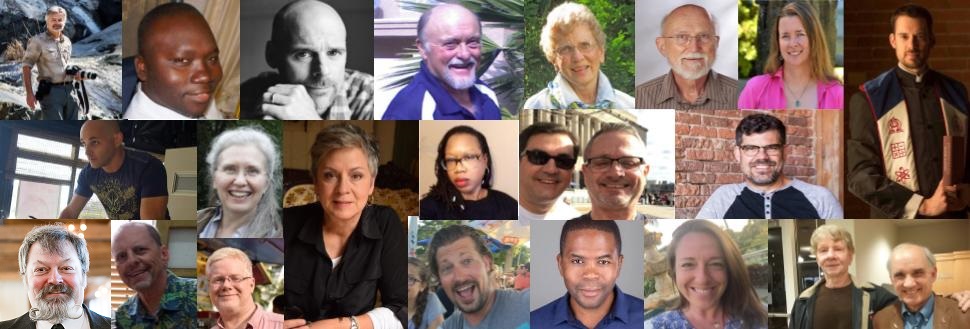
About The Clergy Project
Mission
The Clergy Project is an international nonprofit organization based in the United States. Its Mission is to provide support, community, and hope to current and former religious professionals who no longer hold supernatural beliefs.
The Project of an Online Community of Forums
The Clergy Project centers on a private, secure, and multifaceted Online Community of Forums. Our founders first conceived of this online safe-space as a platform that would allow post-belief religious leaders around the world to gather in support of one another. Thus The Clergy Project’s project is to use this forum to extend the support, community, and hope that our Mission seeks to further.
Benefits of Project participation include:
- Access to an Online Community that is safeguarded with airtight security, allowing closeted post-faith religious leaders to truly be themselves without fear, interacting with nearly eight hundred others privately, in closed groups, or in the open forums.
- Discussions with peers that span the gamut from philosophical topics on ethics and humanism to practical concerns involving relationships and career change.
- Encouragement and valuable insight from others who are further along the journey.
- Friendships with others of similar backgrounds and experiences.
- Realization that none of our participants are alone in their disbelief.
- Supplemental programs available to Project participants, such as the Transitional Assistance Grant (TAG) and the Secular Therapist Project.
Qualifications for Clergy Project Participation
Qualification One: Religious Professionals
Community Forum Participants are current or former religious professionals of any religious tradition, including all levels and varieties of vocational pastors, priests, monks, rabbis, imams, theologians, nuns, missionaries, etcetera. Lay leaders are not considered to be in a professional leadership capacity and therefore do not qualify for The Clergy Project.
We do realize that for some groups, however, even the most high-ranking positions of religious service are more informal compared to those of other traditions, and in such cases we look to the particular practices and structures of each for the definition of corresponding leadership roles.
Qualification Two: Rejection of Belief in the Supernatural
Community Forum Participants are those who have actively rejected belief in a supernatural worldview and have accepted a naturalistic one in its place. We define a supernatural worldview as one accepting an order of existence that is beyond the visible observable universe, appearing to transcend the laws of nature or what can be explained by nature, accepted scientific understanding, or the application of the scientific method.
This is usually attributed to an invisible agent, especially of or relating to a god, demigod, spirit, ghosts, or devils. But it can refer to anything that is above or beyond what is part of the natural world and attributed to some force beyond scientific understanding.
A naturalistic worldview is explained well by Robert T. Carroll in the Skeptics Dictionary as “…one that has no supernatural or mystical element to it. The universe is all we can ever hope to know and there is no compelling reason to posit a supernatural world beyond and in addition to the natural world. The infusion of supernatural elements into human societies is itself a natural phenomenon that has a naturalistic origin and history. There may be elements or forces in nature that are not understood, but there is nothing that requires magical thinking or superstitious positing of transcendent beings to account for them.” [http://www.skepdic.com/naturalism.html]
Rejection of the supernatural has several implications. We do not believe in gods, angels, demons, ghosts, a sentient universe, psychic power, divination, mystical forces, or practices that emanate from belief in mystical forces such as chi, astrology, or feng shui, or using prayer, crystals, or magnets as a method of disease prevention. This is not intended to be comprehensive list. A TCP Community Forum Participant necessarily holds a naturalistic worldview as explained above.
The Screening Process
The goal of screening potential Project Participants is to protect the anonymity of current participants while also providing an opportunity for others to be welcomed into our Community of Forums. Our screening process involves several stages, including disclosure of information regarding your history and a phone interview. We are committed to protecting your privacy. Our screeners will not disclose any information that you share.
Key Points and Clarifications
- Each applicant to The Clergy Project must have already considered themselves a nonbeliever prior to application in order to be considered for Project participation.
- The Clergy Project does not proselytize nor recruit religious leaders to non-belief.
- The Clergy Project does not take a position on whether post-faith religious leaders ought leave or stay in their religious vocations. TCP simply seeks to support participants as they navigate life’s challenges as they see fit.
- For current religious leaders who seek transition to new careers, The Clergy Project provides career development assistance to help them in do so.
- The Clergy Project is not designed for participants of any particular religious background over others, nor is the term “clergy” intended to exclude religious leaders not described as such.
- The Clergy Project was launched with the collaborative efforts of many players, including the Richard Dawkins Foundation for Reason and Science (RDFRS) and the Freedom From Religion foundation (FFRF).
- As of early 2015, The Clergy Project is now its own 501(c)3 nonprofit. An all-volunteer organization, its Board of Directors and its Committee Members are all themselves Project participants with regular involvement in the Online Community of Forums.
- Financial contributions to help support the furtherance of the TCP Mission can be arranged via PayPal or personal check by visiting here.
Official Contacts
General Information: clergy@clergyproject.org
Media and Press: press@clergyproject.org
